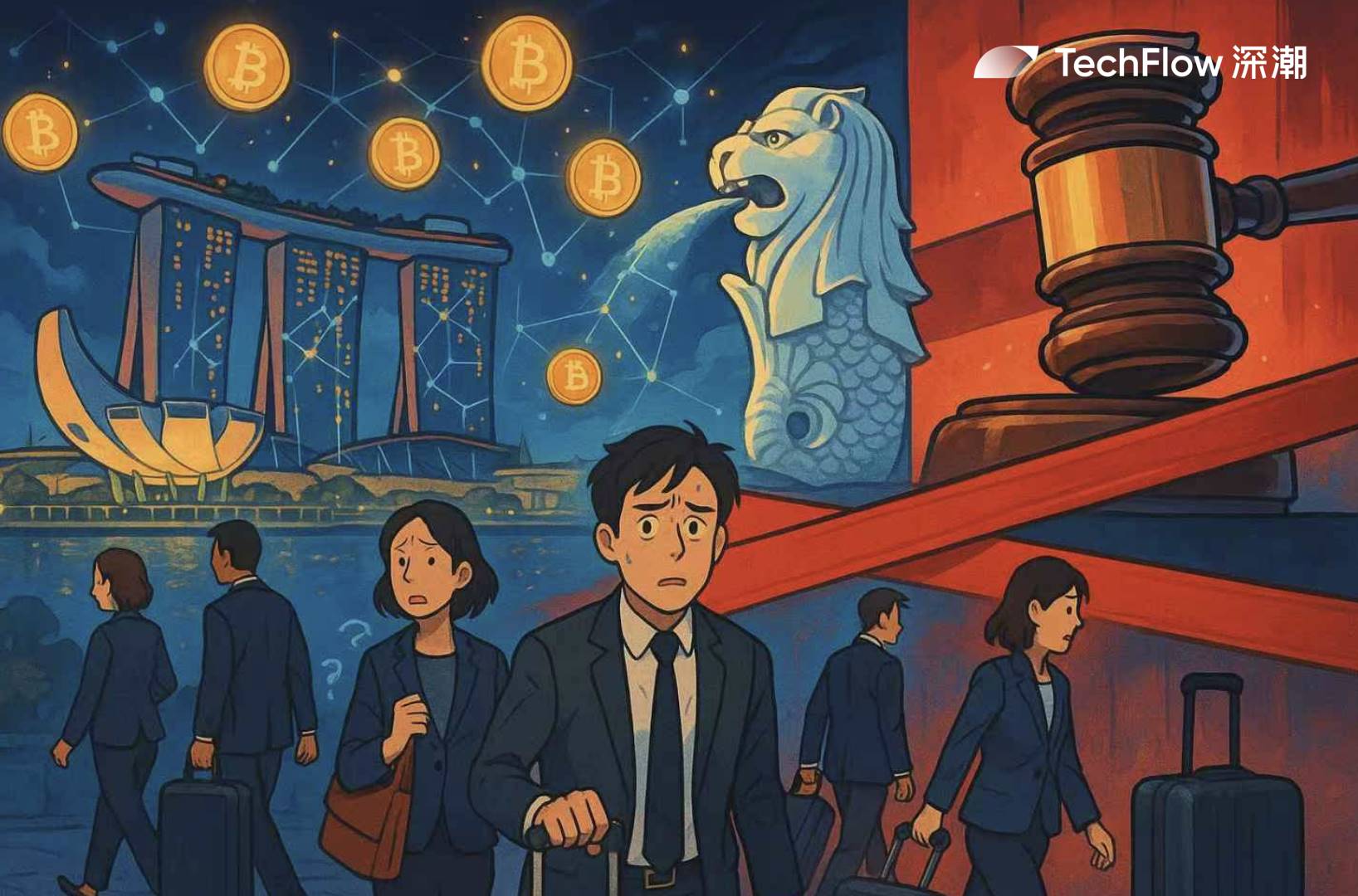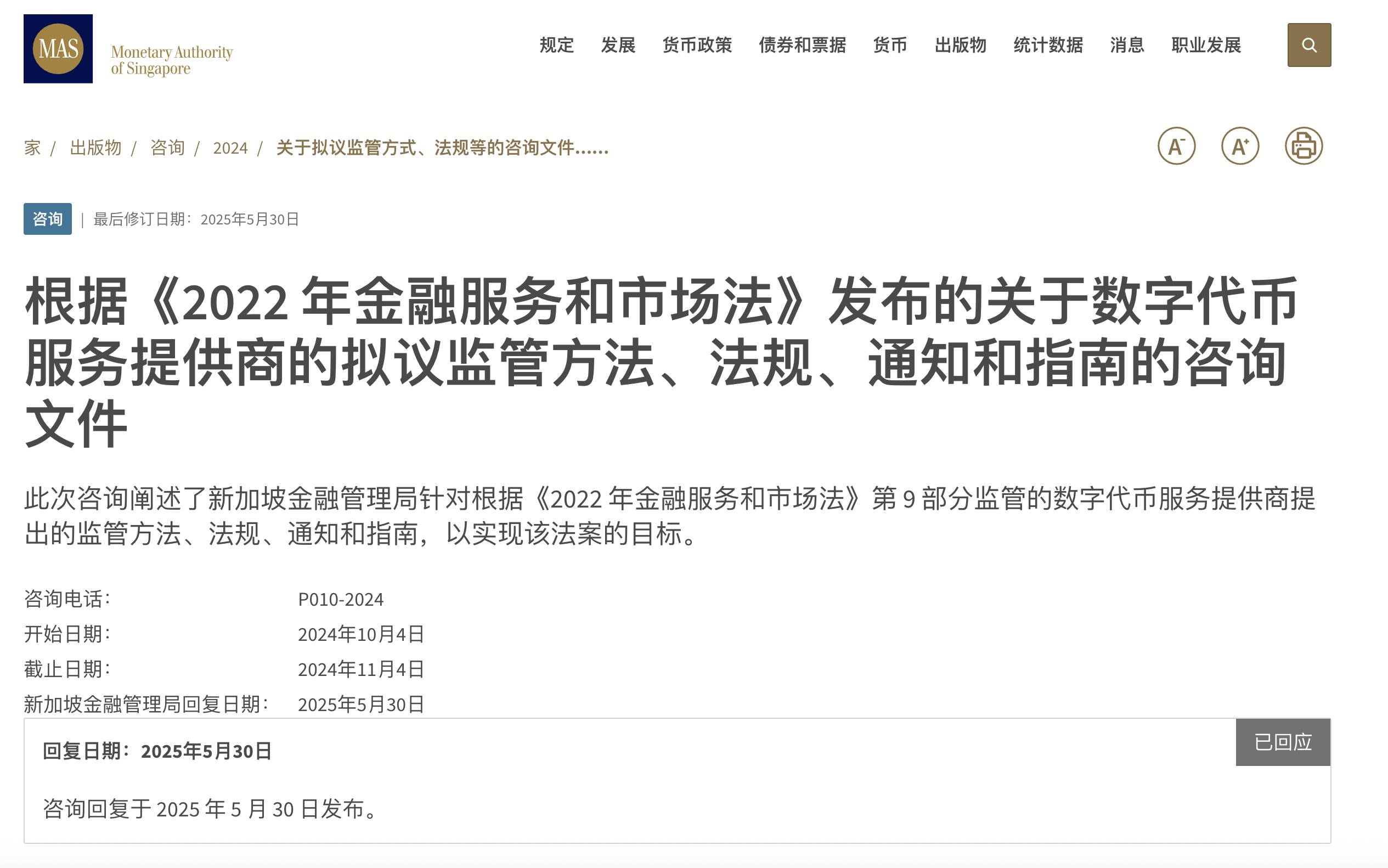Written by: TechFlow

The former Web3 paradise Singapore has started to drive people away.
On May 30, the Monetary Authority of Singapore (MAS) officially released the final policy guidelines for "Digital Token Service Providers (DTSP)", with a very tough attitude:
All crypto service providers registered or operating in Singapore must cease providing services to overseas customers by June 30, 2025, if they have not obtained a DTSP license.
The regulation has no transition period, and violators will be punished according to law. Companies found to be in violation may face fines up to 250,000 Singapore dollars (200,000 USD) and imprisonment for up to three years.
This policy is like a bolt from the blue, making many Singapore crypto practitioners tremble.
As the headquarters of Asian Web3, Singapore has always played the role of a "regulatory arbitrage" perfect place.
Singapore previously implemented a "separate internal and external" regulatory strategy, allowing companies registered in Singapore to freely provide services to overseas customers, with only stricter regulatory requirements for businesses targeting the local market.
Especially when major markets like China implemented comprehensive bans and the US SEC increased enforcement, Singapore timely played the role of a safe haven, providing a safe landing point for numerous crypto exchanges, funds, and project parties, leading to waves of crypto enterprise migration. Even Singapore's sovereign wealth fund Temasek had invested in crypto enterprises like FTX and Immutable, consolidating Singapore's position as the Asian crypto center.
However, this clear regulatory policy is gradually plugging the loopholes of "regulatory arbitrage".
According to the final regulatory response document issued by Singapore MAS, the most stringent key points are:
Comprehensive cross-border business management: Regardless of whether the service targets local or overseas customers, any digital token-related business conducted within Singapore requires a DTSP license, directly cutting off the past regulatory arbitrage path of "registered in Singapore but serving only overseas customers".
Extremely broad definition of business premises: MAS defines "business premises" as "any location used by the license holder to conduct business in Singapore", even including movable booths. This definition almost covers all possible business locations, regardless of size.
Dual coverage of individuals and institutions: The regulatory object includes both individuals or partnerships operating in Singapore's business premises and Singapore companies conducting digital token services overseas, achieving comprehensive coverage of subjects.
Additionally, while MAS states that working from home for overseas company employees is acceptable, the definition of "employees" is blurry, and whether project founders and shareholders are considered employees is entirely at MAS's discretion.
Why did Singapore MAS suddenly strike hard?
This is not a sudden policy attack by Singapore's financial management authorities on crypto companies. As early as 2022, Singapore MAS issued the Financial Services and Markets Act, with the ninth part dedicated to crypto regulation, followed by multiple public consultations and draft solicitations. The May 30 document is a response to the consultation, while also detailing specific regulatory methods, regulations, notifications, and DTSP licensing guidelines.

According to the consultation document, MAS's core consideration is that "some crypto companies might damage Singapore's reputation".
The original text states, "Due to the internet-based and cross-border nature of digital token services, Digital Token Service Providers (DTSPs) are more likely to face money laundering/terrorist financing (ML/TF) risks... The main risk DTSPs pose to Singapore is reputational risk, that is, potentially damaging Singapore's reputation if they are involved in or misused for illegal purposes."
The origin might go back to 2022 when Temasek-invested crypto exchange FTX and local crypto fund Three Arrows Capital collapsed, severely damaging Singapore's financial reputation. The then-Minister of Finance (now Prime Minister) Heng Swee Keat publicly stated that this investment caused reputational damage, and Temasek subsequently imposed salary cuts on the investment team and senior management.
Under the latest regulations, which crypto companies will be affected?
According to the consultation document, all entities related to crypto asset transactions require a license, including crypto trading platforms, crypto custody, crypto transfers, crypto issuance...
With the deadline of June 30, 2025, approaching, panic from social media circles envelops Singapore crypto practitioners, but the predominant emotion is confusion.
"I didn't know about the related policies before, suddenly my friend circle exploded. Currently, opinions vary, and I can only wait and see. At worst, I'll leave Singapore and go to neighboring Malaysia," said project practitioner Adam (pseudonym).
A crypto exchange practitioner Kevin is very melancholic. Their company has already planned to move the entire office to Hong Kong, but he doesn't know the specific timeline. Having been stationed in Singapore for 2 years, he was preparing to apply for Singapore Permanent Residency (PR), and this turn of events leaves him regretful and reluctant.
Previously, Hong Kong legislator Wu Jiezhuang posted on social media to attract Singapore crypto practitioners to settle in Hong Kong, stating: "Singapore recently released the 'Digital Token Service Provider Licensing Guidelines', proposing new policies for companies, institutions, and personnel involved in virtual assets. Since Hong Kong issued the virtual asset declaration in 2022, we have actively welcomed the industry to develop here. According to unofficial statistics, over a thousand Web3 companies have landed in Hong Kong. If you are currently working in the related industry in Singapore and intend to move your headquarters and personnel to Hong Kong, I am willing to provide assistance and welcome you to develop here!"
Cobo crypto custody platform COO and former PAG Mega Investment Group legal counsel Lily believes the policy's panic has been exaggerated. The policy maintains MAS's consistent regulatory style, primarily affecting non-licensed exchanges' Singapore front-ends and substantive operating teams. It won't impact Cobo and other exempted enterprises, licensed companies, or institutions outside the licensing regulatory scope.
According to Singapore MAS website data, 24 enterprises including COBO, ANTALPHA, CEFFU, MATRIXPORT are on the exemption list, and 33 enterprises like BITGO, Circle, Coinbase, GSR, Hashkey, OKX SG have obtained DTSP licenses.
For these licensed and exempted enterprises, the new policy instead creates a fairer competitive environment, enhances the reputation value of licensed institutions, and lays the foundation for global expansion.
Correspondingly, as the era of regulatory arbitrage ends, some offshore crypto companies based in Singapore have begun migrating to Hong Kong, Dubai, Malaysia, and other locations.
Adam believes that crypto practitioners leaving Singapore is a major trend, and this policy merely accelerates this process.
"Singapore's living costs are high, boring, and more importantly, there are too few opportunities to make money. I want to live in Japan and make money in Dubai".
Once upon a time, Singapore was called the "Jerusalem of Crypto Jews", but now with its doors tightening, crypto Jews must continue to wander in search of greener pastures.





